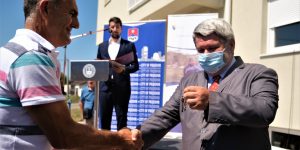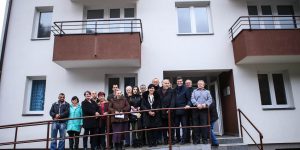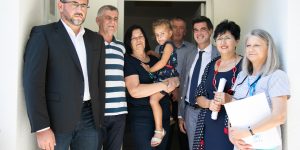On 6 April, the management team of the State housing project in Bosnia and Herzegovina presented in Sarajevo the developments concerning the implementation of the Regional Housing Programme to representatives of donors and partner organizations, led by Nicola Bertolini, Head of the Department at the European Commission Directorate General for Enlargement and Massimo Mina, Head of Operations Section for Social Development , Civil Society and Cross Border Cooperation at the EU Delegation to BiH.
Before presentation of the results, they met with the BiH Minister for Human Rights and Refugees Semiha Borovac and representatives of entity and the Brcko District Government, where the importance of the Regional Housing Programme was stressed, which is expected to provide housing solutions for nearly 27,000 households, or about 74,000 refugees and displaced persons in Bosnia and Herzegovina, Serbia, Croatia and Montenegro. The total value of the program is around 1.2 billion KM, of which around 200 million is for BiH.
Minister Borovac stressed that this would not be feasible without the support of the international community, primarily the EU, as a major donor, and the United States, UNHCR, OSCE and the Council of Europe Development Bank. So far BiH 80 million was granted to four sub-projects within which housing will be provided to about 1,870 families in more than 70 cities and municipalities across the country. Construction is under way, and the next week the ceremony will be held to hand over keys of newly built and renovated houses in Olovo. By the end of this year keys will be hand over to another 200 families, and in the following year to more than 1,400 families. This is for the return of refugees from BiH residing in neighbouring countries, and return or local integration of internally displaced persons in BiH.
Minister Borovac also stressed the challenges that BiH is facing to successfully complete the Programme, and the final result of the implementation of Annex VII of the Dayton Agreement will depend on it. Special thanks was expressed to the recently approved grant support amounting to 700,000 EUR, adding that the successful completion of this Programme requires additional support including financial but speeding up the process of verification of users, particularly those taking place in neighbouring countries, primarily the Republic of Croatia, which needs to screen about 3,500 refugees from Bosnia and Herzegovina to check if they fulfil the conditions for the assistance through this Programme.
“A particular challenge is the fact that the real need for the implementation of Annex VII still exceed the available opportunities even of this the largest post-war donor Programme, which is also the last initiative of the international community of its kind in the region. The joint solution of this problem will lead to strengthening good neighbourly relations, restoring confidence, strengthening the economy, and achieving the priority goal – higher stability and security in the region whose future is in the EU,” said Borovac.
Borovac and Bertolini jointly stressed that in addition to providing housing, sustainable return also requires road and utility infrastructure, as well as the conditions of employment, education, provision of health care and similar for returnees not to be left on their own, and this Programme without these conditions would be meaningless.



